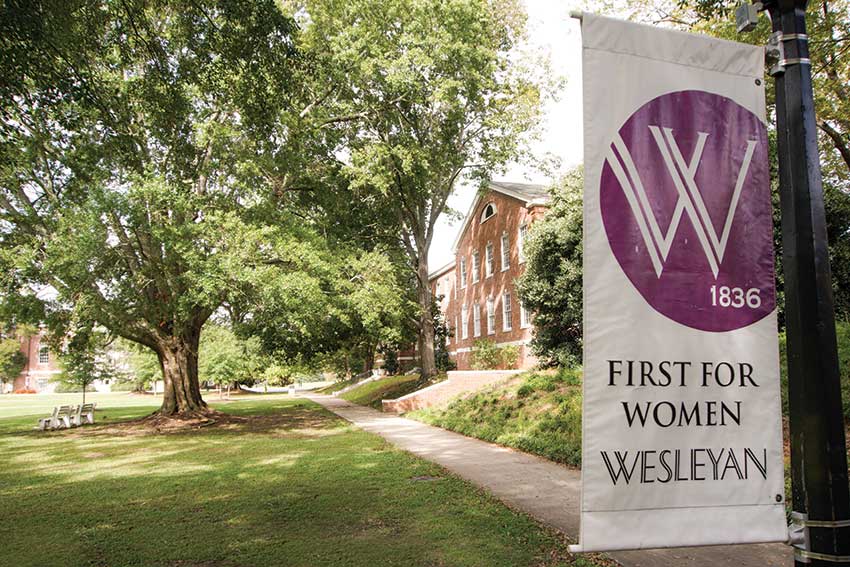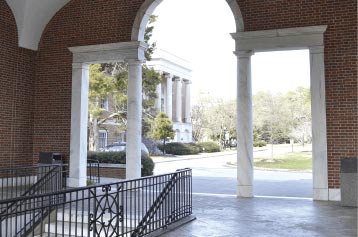2023-2024 Catalogue
Biology (BIO) Course Descriptions
BIO 103: Human Biology.
Goal: To familiarize the student with the practice and issues of applying the scientific method and modern biological techniques to the study of the human condition.
Content: An exploration of the biological approaches to the study of the human species, human populations, and the human body. The first part of the course examines cell theory, Mendel and molecular genetics, population biology, ecology, evolution, and modern advances in biotechnology. These serve as contexts in which to evaluate applications of the scientific method to understanding human existence and our interactions with the natural world as individuals and societies. The second part of the course focuses inward on functions of the human body, including nutrition, maintenance of the internal environment, neural and endocrine control, immune responses, circulation, respiration, reproduction, development, and aging. Laboratories involve data collection and analysis of experiments directly related to human biology, using both classic and modern technological approaches, computers, biochemical and physiological test equipment, simulations and case studies. Lab fee.
Prerequisites: None.
Gen. Ed. Category: Exploring; Natural World; (SM).
Credit: 4 hours.
BIO 110: Principles of Biology I-Biological Processes.
Goal: To expose the student to the underlying principles of biology, including the requirements of living systems, the interaction of life with the physical world which supports it, and the molecular basis that unifies all living things.
Content : The principles of evolution, ecology, and genetics. An introduction to the biome that comprises all living things. An introduction to the cellular basis of life. Lab fee.
Prerequisites: Students are required to have either a Math SAT (or ACT equivalent) of at least 500, or placement into MAT 140 (or higher) or sophomore standing for entry into BIO 110.
Gen. Ed. Category: Exploring; Natural World; (SM).
Credit: 4 hours.
BIO 112: Principles of Biology II-Diversity of Biological Systems.
Goal: To expose the student to the unity and diversity of the living organisms that inhabit the earth. To examine the mechanisms involved in the structures and processes used by living things to accomplish the requirements of continued existence.
Content : The systematic survey of the major groups of organisms from the bacteria to the higher vertebrates. A systems approach to the functioning of living organisms from the cellular to the whole organism levels. Lab fee.
Prerequisite: BIO 110 (with a grade of C or better).
Credit: 4 hours.
BIO 155: Introduction to Research.
Goal: This course is intended to give students an introduction to scientific research methods and practices.
Content: The focus of the course will be skill building, basic laboratory techniques, research design and execution of a short research project, development of oral and written presentations.
Prerequisites: BIO 110 and BIO 112 or CHM 101 and CHM 102.
Credit: 1-3 hour.
BIO 203: Research Methods in the Biological Sciences.
Goal: To learn basic methods and techniques of research in the natural sciences, especially biology and chemistry. To become proficient in the conduct of science and presentation of scientific information. To explore practical, philosophical, and ethical aspects of science. To improve public speaking skills in both large and small group settings.
Content: A "hands-on" introduction to all aspects of the scientific method and scientific research. Students conduct experimental practical and self-designed research projects, including initial formulation of hypotheses, experimental design and instrumentation, data analysis, and preparation of results for presentation. Students prepare critical reviews of published papers, formal written research reports, and presentations of original research designs and results in written, graphical, and oral formats. Lab fee.
Prerequisites: BIO 110 (with a grade of C or better), MAT 140.
Gen. Ed. Category: Foundation Building; Speaking.
Credit: 4 hours.
BIO 208: Field Biology.
Goal: To practice field techniques and quantitative skills commonly used in outdoor scientific disciplines. To learn to identify the conspicuous plant and animal species of Georgia and consider how they are adapted to their environments.
Content: Students will be introduced to the flora, fauna, and ecosystems of the southeastern United States in this field-intensive course. Emphasis will be on practical aspects of conducting scientific investigation outdoors, namely: taxonomic skills, field identification of plants and animals, use of dichotomous keys, techniques for sampling and describing natural populations and communities, and quantitative skills for analysis of data. Lab fee.
Prerequisites: BIO 110 and BIO 112; or ESC 150.
Credit: 4 hours; cross-listed as ESC 208.
BIO 210: Human Anatomy and Physiology I.
Goal: To introduce the student to human gross and microscopic anatomy and physiology. To encourage the student to think synthetically about the interrelationships among form, function, development, and pathology of the human body.
Content: An introduction to organism structure, basic biochemistry, cytology and cell physiology, and histology and tissue physiology. A practical study of the structure and function of the human integument, skeletons, nervous, and sensory systems. The emphases of the course are on relating structure to function, relating gross and microscopic anatomy, developing 3-dimensional visualization skills, and becoming comfortable with the terminology of human anatomy and physiology. This is the first semester of the two-semester sequence in Human Anatomy and Physiology at an intermediate level. Lab fee.
Prerequisite: BIO 103 with a grade of C or better or BIO 110 with a grade of C or better.
Credit: 4 hours.
BIO 211: Human Anatomy and Physiology II.
Goal: To continue the introduction of the student to human gross and microscopic anatomy and physiology. To encourage the student to think synthetically about the interrelationships among form, function, development, and pathology of the human body.
Content: A practical study of the structure and function of the human endocrine, cardiovascular, lymphatic/immune, respiratory, digestive, excretory, and reproductive systems. An introduction to human nutrition, development, health, and pathology. The emphases of the course are on relating structure to function, relating gross and microscopic anatomy, developing 3-dimensional visualization skills, and becoming comfortable with the terminology of human anatomy and physiology. This is the second semester in the two-semester sequence in Human Anatomy and Physiology at an intermediate level. Lab fee.
Prerequisite: BIO 210.
Credit: 4 hours.
BIO 235: Histology.
Goal: To deepen student understanding of tissue function by examining tissue form at the microscopic level. Special emphasis will be made in helping students understand the dimensional context of structures and the function of these structures in relation to organ and organ system physiology.
Content: Identification of cell structure and relation of form to function. Microscopic analysis of all major organ systems. Development of proficiency in common histologic techniques, including tissue fixation, embedding, sectioning and counterstaining. Identification of select pathologic forms and the impact of these alterations on normal organ function. Lab fee.
Prerequisites: BIO 110 and 112.
Credit: 4 hours.
BIO 245: Microbiology.
Goal: To survey the general characteristics of microorganisms, including morphology, classification, and ecology. To practice sterile techniques and procedures for identifying and culturing microorganisms.
Content: An introduction to the structure, physiology, and reproduction of bacteria, viruses, and fungi; disease effects and control of pathogenic microorganisms; and principles of immunology. Lab fee.
Prerequisites: A grade of C or better in either BIO 103 or BIO 110.
Credit: 4 hours.
BIO 256: Reproductive Biology.
Goal: To examine the mechanisms which govern reproductive tract function in vertebrate animals, using a combination of theoretical and experimental techniques. A major focus of this course will be human reproductive biology, with additional emphasis on the use of animal models to illustrate underlying molecular principles which regulate reproductive function.
Content: Examination of reproductive strategies and the utility of sexual versus asexual reproduction in maintaining diversity. Microscopic exploration of embryonic reproductive tract development and examination of disorders in this process. Introduction of conserved molecular mechanisms which govern reproductive tract function. Discussion of environmental and social factors which impact reproductive success. Consideration of ethical implications of new reproductive technologies. Lab fee.
Prerequisites: BIO 110 and 112 and BIO 203
Credit: 4 hours.
BIO 265: Immunology.
Goal: To introduce students to the fundamental principles underlying the formation and function of the mammalian immune system.
Content: This course focuses on differences in innate versus acquired immunity, antigen/antibody interactions, B and T cell activation, genes and genetic rearrangements involved in the development of lymphocytes and mechanisms underlying immune disorders. Lab fee.
Prerequisites: BIO 110 and 112.
Credit: 4 hours.
BIO 270: Vertebrate Zoology.
Goal: To survey the classes of vertebrates in order to develop an understanding of their phylogeny and adaptations.
Content: An anatomical, physiological, and behavioral comparison of vertebrates with an emphasis on functional morphology, structural design, ecological adaptations, natural history, and evolution. Lab fee.
Prerequisites: BIO 110 and 112.
Credit: 4 hours.
BIO 280: Ecology.
Goal: To understand the interrelationships between living organisms and their physical and biological environment. To develop a broad understanding of the field of ecology. To conduct ecological research.
Content: Ecological principles at the level of the individual, population, community, and ecosystem. Specific topics include nutrient cycles, flow of energy in ecosystems, population dynamics, evolutionary ecology, life histories, competition and other community interactions, succession, and island biogeography. Current topics in anthropogenic global change. Lab fee.
Prerequisites: BIO 110 and 112; or ESC 150.
Credit: 4 hours; cross-listed ESC 280.
BIO 311: Genetics.
Goal: To explore the principles involved in the inheritance of characteristics from generation to generation, from the molecular basis of heredity through the population as a unit of evolution.
Content: Mendel, molecular, and population genetics. Biomedical applications of new, genetically based technologies. Lab fee.
Prerequisites: BIO 110, 112, and 203.
Credit: 4 hours.
BIO 315: Animal Behavior.
Goal: To familiarize the student with the biological study of animal behavior. To introduce the student to the major historical and contemporary perspectives of behavioral study. To allow the student to practice field and laboratory methods of behavioral sampling and analysis. To encourage the student to practice critical evaluation and presentation of representative examples of contemporary ethological literature and studies.
Content: A practice-oriented survey of contemporary approaches to animal behavior, including behavioral genetics, behavioral development, neuropathology, behavioral endocrinology, behavioral ecology and evolution, ethnology and sociobiology. Lab fee.
Prerequisites: BIO 103 or 110; BIO 203 or PSY 305.
Credit: 4 hours; cross-listed as NSC 315.
BIO 318: Biochemistry.
Goal: To survey the structure, function, and metabolism of the basic classes of organic molecules. To interrelate the various metabolic pathways into a unified concept of metabolism at the organism level.
Content: Protein, carbohydrate, lipid and nucleic acid structure and synthesis. The metabolic pathways in which these four classes of molecules participate.
Prerequisites: BIO 110, 112 and CHM 101, 102, 221.
Credit: 3 hours; cross-listed CHM 318.
BIO 320: Molecular Cell Biology.
Goal: To introduce modern cell biology with an emphasis on the molecular structure, function, and regulation of proteins involved in fundamental metabolic processes including protein transport, cell signaling, cell attachment, and cell proliferation.
Content: Definition of cell structures, regulation of activities by membranes, derivation of energy from the environment, mechanisms of biosynthesis for growth and repair, transmission of genetic information, and strategies for cell recognition. Lab fee.
Prerequisites: BIO 110, 112, and 203.
Credit: 4 hours.
BIO 325: Neurophysiology.
Goal: To familiarize the student with the theoretical bases and experimental methods of modern neurophysiology, appropriate to studying the structure and function of individual nerve cells and small neuronal systems.
Content: A practice-oriented introduction to functional cellular neurobiology, focusing on electrophysiology. Laboratory exercise and discussion topics will include electrophysiology, histology, and neurochemistry techniques, neuronal membrane dynamics, synaptic function and plasticity, sensory coding, sensor coordination, central pattern generation, and network function. The primary methods of laboratory study will be intracellular, extracellular, multicellular and whole animal electrophysiology, cell and synaptic simulations, and computer simulations of neuronal and network function. Lab fee.
Prerequisites: BIO 103 or 110; BIO 203 or PSY 305; PSY 207 or consent of instructor.
Credit: 4 hours; cross-listed as NSC 325.
BIO 340: Animal Physiology.
Goal: To familiarize the student with the fundamental principles underlying the functioning of animals, from cellular to organism levels.
Content: A detailed survey of the mechanisms of animal physiology, taught primarily from an organ-systems perspective. Topics include membrane dynamics, neuronal and nervous system function, muscle physiology; cardiac function and circulation, respiration, digestion, excretion, endocrinology, and reproduction. This course takes a comparative approach to animal physiology, with a focus on physiological mechanisms in vertebrates, including humans. Lab fee.
Prerequisites: BIO 110, 112; BIO 203 or PSY 305.
Credit: 4 hours.
BIO 341: Developmental Biology.
Goal: This course will allow the student to explore the mechanisms and structures involved in the ontogeny of animals.
Content: The development of animals from fertilization through birth/hatching; examination of molecular/structural/temporal regulation of developing vertebrate and invertebrate organisms. Lab fee.
Prerequisites: BIO 110, 112, and 203.
Credit: 4 hours; cross-listed as NSC 341.
BIO 345: Forensic Biology.
Goal: The course will require students to apply fundamental cell biological, biochemical, histological, physiological and molecular biology principles and techniques to the analysis of trace materials that are typically found at crime scenes.
Content: This course will emphasize critical thinking and problem solving skills and will reinforce the importance of accuracy in laboratory science experiments. Course material will cover the biochemical, physiological and molecular basis of forensic methods and case studies will be used to contextualize the use of forensic biology techniques as they are applied to crime scene investigation and conservation biology. Laboratory exercises will include histological analysis of plant, animal and human tissues, basic and forensic serology techniques and forensic DNA analysis. Lab fee.
Prerequisites: BIO 110 and BIO 112.
Credit: 4 hours; cross listed as FSC 345.
BIO 350: Principles of Evolution.
Goal: To understand the mechanisms and results of evolution. To review historic and current controversies in evolutionary studies. To examine the diversity of approaches, both theoretical and empirical, used in the study of evolution.
Content: The principles of evolution, genetic variation, population genetics, adaptations, natural selection, population structure, speciation, biogeography, phylogeny, coevolution, and macroevolution.
Prerequisites: BIO 110, 112, and 203, or permission of instructor.
Credit: 3 hours.
BIO 360: Conservation Biology.
Goal: To understand the reasons why many species are endangered, to examine possible solutions, and to consider the ethical and ecological ramifications of species extinctions. To appreciate the interdisciplinary nature of conservation biology by considering issues ranging from the level of the gene to the scale of the entire biosphere.
Content: Students read, review, and discuss current literature in this speaking-intensive course. Students will conduct both laboratory and field-based studies. Topics include defining diversity, threats to biodiversity, population genetics of rare species, conservation strategies and nature preserves, and legal and ethical issues. Lab fee.
Prerequisites: BIO 110 and 112; or ESC 150.
Credit: 4 hours; cross-listed ESC 360.
BIO 396: Special Topics in Biology.
Goal: To provide the opportunity to explore topics outside those offered elsewhere within the biology curriculum or to explore in greater detail a subject covered by another course.
Content: An in-depth examination of a special topic within biology. Topics will vary from semester to semester.
Prerequisites: BIO 110, 112, and 203, or permission of instructor.
Credit: 3 or 4 hours. A student may take a maximum of six to eight semester hours (two courses) of special topics in any one field.
BIO 440: Senior Integrative Exercise in the Life Sciences.
Goal: To provide a capstone integrative experience for seniors majoring in biology, neuroscience, and environmental studies. To prepare for careers and professional growth by discussing future goals and reflecting on past collegiate experiences, both in the major and in the general education curriculum.
Content: With faculty guidance, students will work individually to research a focused topic integrating concepts of biology, neuroscience, or environmental studies with those of another academic discipline. Students will work collaboratively in a small group to organize oral presentations incorporating individual topics into a broader theme, question, or problem. Students will make their presentations at the end of the semester to students and faculty in the Division of Natural Sciences and Mathematics. Students will also critique resumes and prepare cover letters for a variety of postgraduate opportunities.
Prerequisites: Declared major in Biology with senior standing and completion of BIO 110, BIO 112, and BIO 203; or declared major in Environmental Studies with senior standing and completion of ESC 150 and at least one 200- or 300-level ESC class; or declared major in Neuroscience with senior standing and completion of NSC 207, NSC 325, or NSC 335; or consent of instructor.
Credit: 3 hours; cross-listed as ESC 440 and NSC 440.
BIO 451: Directed Independent Study.
Goal: To enable a student to explore intensively a topic of special interest. To promote original, independent, creative, and critical thinking. To attempt to answer questions of a scientific nature. To provide an opportunity to conduct independent laboratory research and learn new techniques.
Content: Directed independent work of a scholarly nature. Emphasis on research methods.
Prerequisites: BIO 110, 112, and 203, and permission of program director.
Credit: 1-6 hours.
BIO 452/199: Field Study.
Goal: To enable a student to experience a potential career opportunity. To acquire specific knowledge in the area of internship.
Content: An opportunity whereby a student may obtain credit in biology for experience gained in a biology-related internship or activity. Specific content is submitted by the student and should include objectives, anticipated activities, appropriate reading list, and nature of progress reports to be submitted to faculty sponsor.
Prerequisites: Adequate coursework for the placement selected and permission of the faculty advisor; approval of the Director of Career Development.
Credit: 1-12 hours.
BIO 499: Honors Thesis. (Fee required).



